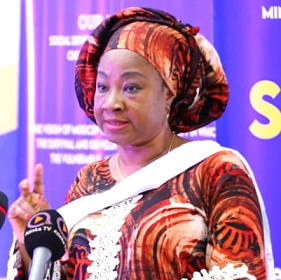
Gender Ministry holds summit on financing social protection
The Deputy Country Representative of UNICEF, Fiachra McAsey, says the COVID-19 and the Sahel crisis in neighbouring countries suggest a strong need to invest in social protection to mitigate and respond to future shocks and ensure a strong and resilient child protection system in Ghana.
He said this year's high inflation levels had put increased pressure on poor and vulnerable households, potentially pushing more into absolute poverty.
Mr McAsey made this known at the Ministry of Gender, Children and Social Protection’s (MoGCSP’s) fourth annual summit held in Accra last Tuesday.
The summit, which was themed “Strengthening Resource Mobilisation for Effective Social Service Delivery”, brought together stakeholders, including development partners.
The objective of the summit was to have a broad understanding and agreement on the key priority issues facing the financing of social protection and child protection programmes among others.
Mr McAsey said in 2022, the ministry was one of the least funded social sector government organisations, receiving less than 0.6 per cent of the total government expenditure, adding that that indicated a decreasing prioritisation of social and child protection financing against the increasing levels of poverty and inequality in the country.
He said even before COVID-19, evidence indicated that 2.4 million Ghanaians were extremely poor, 28.2 per cent of children being monetarily poor and 73.4 per cent others suffering from multi-dimensional poverty, with children from rural areas being more vulnerable.
These developments, in addition to the current macroeconomic challenges, he added, required the prioritisation of social protection as a macro-critical sector and child protection during budgeting, release and execution of funds. He, therefore, reaffirmed UNICEF’s support for the ministry's efforts in this area.
Stringent measures
The Minister of Sanitation, Cecilia Dapaah, who is also the Caretaker Minister of Gender, Children and Social Protection, who was represented by the Chief Director, Dr Afisah Zakariah, said the economic situation in the country and across the globe had compelled the government to take stringent measures limiting resources available to the sector, adding that that demanded that “we identify alternative sources of revenue to enable us to deliver on our mandate effectively and efficiently in the coming years”.
She said it was worth noting that despite the current challenges, the ministry had worked tirelessly to roll out critical activities aimed at strengthening the policy and legal environment for gender equality, promoting and protecting the welfare of children, women, the aged, Persons With Disability (PWDs) and other vulnerable groups.
She said the ministry was currently reviewing its Social Protection Strategic Plan, the Early Childhood Care and Development Policy, the National Gender Policy and the Domestic Violence Policy among others to ensure that all emerging issues affecting the vulnerable in society were mainstreamed for effective social services delivery.
The Chairperson of the Parliamentary Standing Committee on Gender and Children, Francisca Oteng Mensah, in a message said the prevailing economic conditions being experienced not only in Ghana but worldwide made it very expedient to discuss and find workable ways in which women and children could be cushioned, adding that “not only that, but more importantly, how those interventions can be financed and sustained”.
The Programme Specialist, Sexual and Reproductive Health and Gender Team Lead, United Nations Population Fund (UNFPA), Doris Mawuse Aglobitse, on behalf of the Country Representative, Barnabas Yisa, called for the need for more evidence generation and data on the economic challenges and financial crisis on Gender Equality and Women Empowerment (GEWE) and Gender-Based Violence (GBV), research work on the economic benefits of investment in promoting gender equality and prevention of GBV to Gross Domestic Product (GDP), as well as the need for a special unit within the ministry to lead the process for resource mobilisation from development partners and private sector and the coordination of projects.
The Director of the Department of Children, Florence Ayisi Quartey, in a welcome address said the country had made significant investments in key social protection and child protection programmes, resulting in improvement in the lives of the less privileged.
However, she said a critical area that needed to be looked at for effective service delivery was resource mobilisation, saying countries that had recorded major successes in social service delivery had made substantial investments in the sector.
Writer’s email: rebecca.quaicoe-duho@graphic.com.gh

